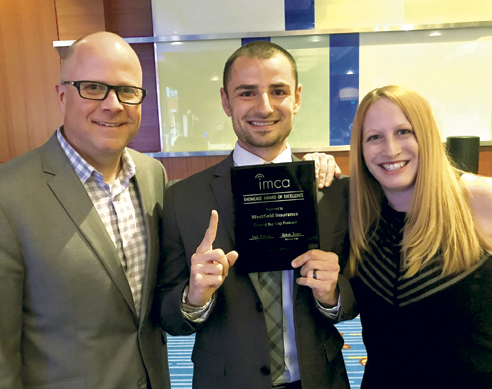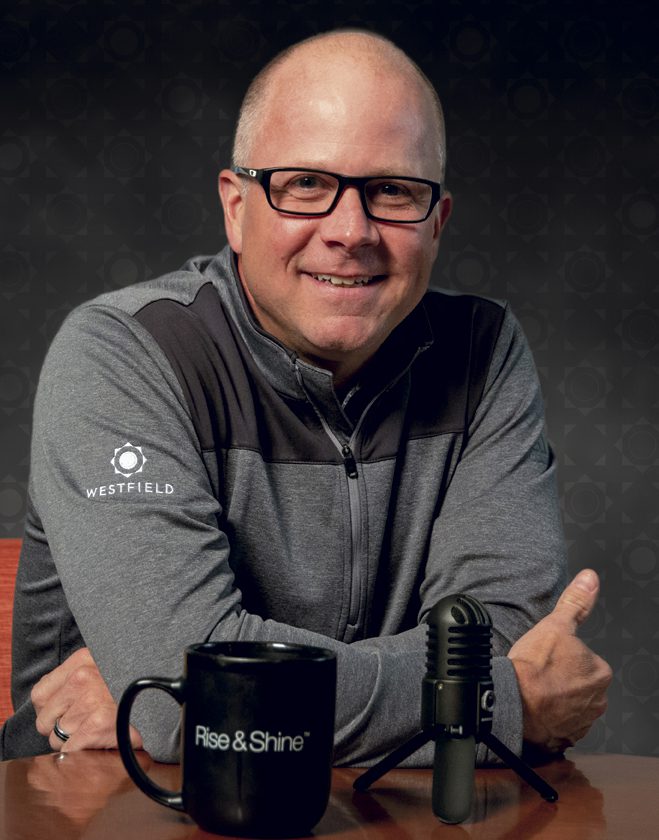Professional Development
CLOSING THE GAP
Westfield Insurance podcast discusses issues and challenges that agencies face
By Christopher W. Cook
Premiering on June 18, 2018, Closing the Gap, a weekly podcast produced by Westfield Insurance, focuses on independent agents and agency owners.
“We bring forward many of the resources that we have from our work in and around the industry and share them and expert advice to help independent agencies and other small businesses grow and protect their assets,” says Chris Cline, national agency distribution leader with Westfield and the podcast’s host. “We’ve had interviews that are deep and technically oriented about insurance agency operations, and have mixed in humor, experts from other businesses, and even science and neuroscience along the way.”
The idea to create Closing the Gap, which can be heard where podcasts can be heard—sites like iTunes, Apple Podcast, Spotify, as well as on Westfield Insurance’s website—originated from Cline’s exposure to the medium.
“I commuted an hour to work each day when I went to the office and listened to a lot of talk radio for entertainment as well as personal growth, and I started to become exposed to podcasts,” he says. “Throughout 2016 and 2017, I spent a lot of time out in the industry on behalf of our organization and was getting to meet a lot of great folks who were thinking differently about the future of our industry. Pulling all of that together, along with my own personal development, and observing our employees who were being asked to participate in industry events, it hit me how many intelligent people that there are in the industry who are sharing ideas with each other, but maybe not to a broader audience.

“Working with our agencies, they will always ask carrier representatives what the best performing agencies are doing, how their peers are performing, and best practices they should be focused on,” Cline continues, “but oddly enough, there can be some sensitivity around that conversation with one of their carriers. I was struggling with how I take all this great knowledge out there and do something with it. Driving back and forth to work while listening to a lot of podcasts, it hit me that there really wasn’t a carrier taking this point of view and perspective in the industry in a way that wasn’t overly salesy for the carrier.”
Cline pitched the idea to his boss, who proceeded to give him the green light. Cline teamed up with Hadie Bartholomew, Westfield’s media content leader, and Rob Koszkalda, the firm’s social media marketing manager, on the project.
“They’re kind of newer to the organization, and they’ve got some great ideas,” Cline says. “What was really cool was at the time we were relaunching an entirely new brand for Westfield, which was to bring a more consultative approach to everything—a more holistic view of risk and to think about insurance in a non-traditional way.”
With a new brand developed, the trio brainstormed ideas to contribute to it, knowing that there are a number of additional thought leaders at Westfield doing meaningful work. When combined with their individual networks and Westfield’s partnerships, they quickly agreed there was an incredible amount of value that they could help bring to the industry.
“We’re always paying attention to things in our personal lives and our professional lives that can look like content,” Cline says. “We meet at a minimum every couple months to share ideas—what topics are relevant, or who would be viable guests.
“We get feedback pretty regularly and one of the things that makes the show appealing is that there’s a real level of intellectual curiosity and approach that goes into the way we talk to guests in that it’s not a pure interview format,” he continues. “It really is intended to be conversational and inquisitive. The best ones you can just get in the car and drive on a Saturday afternoon, listen and enjoy the ride.”
The show
During the early days of planning, one discussion that came up was the length of the program.
“It’s entertaining to think that when we pitched the idea back in the end of 2017/early 2018, we thought that 12 minutes was probably our sweet spot,” Cline says. “People had shorter commutes. Then, every time we were planning together, we kept talking about how great a Joe Rogan-type show was, but they’re two or three hours long.
“So, we just systematically kept creeping—to 15 minutes, to 20 minutes, to 25 minutes, to 30 minutes. In the beginning of 2019, about six months in, we tested a few long-format shows and had a couple get north of 50 minutes. Those guests were well-known people in our industry and phenomenal thought leaders. We got to the point where we conceded that if the conversation is good and the content is quality—now our episodes are around 40 to 50 minutes. That’s the absolute power of a podcast, you can start and stop and listen to it on your own terms.”
The show starts off with an introduction of the guest and sets the stage for them to tell their story.
“It seems to be consistent feed-back that letting the guests set their own stage, talking about their career, their passion and how we ultimately got to the point where we’re having today’s conversation creates good content,” Cline says. “We almost always learn something new about the guest.”
Prior to recording the podcast, a pre-call or email swap with the guest generally results in three to five themes to be discussed during the episode. Toward the end of the show, “we try to end with some sort of call to action, whether that is to check out the book if the guest’s an author, to do something different with your agency, or to reach out to somebody,” Cline says. “The show is not about Westfield; it is about content to help the agencies that represent us, the businesses that they serve, and really the people that are in them.”
The core conversations in each episode revolve around what is referred to as the “Big Three,” which later became the “Big Three Plus One.” These are:
- Talent acquisition and succession planning
- The digital customer experience and journey
- Data and analytics
- Diversity and inclusion
“The podcast stays centered around bringing value inside those areas,” Cline says. “We have episodes about agency valuation, culture, attracting talent, intrinsic versus extrinsic motivation and how you drive sales, marketing, social media, digital tools, etc. Even if they feel a little bit further derivative from the Big Three Plus One, all have roots in our desire to bring content to agencies that we believe will make them better people, better professionals and better insurance agencies.”

—Chris Cline
National Agency Distribution Leader
Westfield Insurance
While helping others develop personally and professionally is the show’s primary focus, there’s still time to have fun in the process. In the spring of 2019, around 40 episodes into production, Closing the Gap recorded live from an industry conference in New Orleans.
“We had this idea to do like a David Letterman ‘Man on the Street’ type of thing; that was kind of rock star status for us,” Cline says. “Our company was a sponsor of the event and we had a spot on the tradeshow floor in the exhibit hall, and we set up our booth. We interviewed people we met at our booth and had an ‘on air’ sign that we made. We kind of made a big deal out of it. And watching the people on the tradeshow floor stand around our booth as we recorded ‘live in front of a studio audience’ type of thing, it was energetic. The people who were guests for the few episodes we did at that event just absolutely had a blast.”
Episodes
Episodes generally begin with its introduction: “Welcome to Closing the Gap, Westfield’s podcast in which we discuss some of the issues and challenges your agency may be facing today and bring forward some of the insights and ideas that we’ve gathered from our work in and around the industry. Because if it matters to you, it matters to us.”
From insurance agency leaders, former professional athletes turned motivational speakers, and social scientists/professors, Closing the Gap has provided a wide variety of guests over the past years. Here is a small sampling:
Episode 38: Underwriter to Agency Owner
This episode featured Sarah Brown, president of Keller-Brown Insurance Services (see the Rough Notes Novem-ber 2019 “Broken Glass” feature), a fifth-generation agency owner who took the reins that same year. She shared the agency’s history, discussed her career from department to department as she was prepared for ownership, and the transition itself.
As a new agency owner in a long-time family-operated agency, she also focused on how things may change—or stay the same—under her leadership, and struggles with adapting technology.
“Technology is just changing so fast,” Brown said. “The greatest thing today is probably not going to be the greatest thing in a year or two. It’s just so frustrating because it takes time to research and implement and have procedures and then it’s changed; it’s out of date.”
As for the agency culture, “we want to keep the family atmosphere,” she said. “We pretty much hire personalities. We’re looking for curiosity, like if you ask a question and someone gives you an answer—the curiosity to follow up and say, ‘well tell me more,’ or if they don’t know something, they go research it themselves instead of just taking it at face value.”
Episode 70: The Winning Edge
Shawn Harper, a retired NFL player, motivational speaker, author, and the CEO of American Services and Protection, a Columbus, Ohio-based security solutions firm, shared his “rags to riches-like” story and performance strategies for winning in life and business.
Growing up with learning disabilities, Harper recalled repeating the first grade, barely graduating from high school and feeling like an overall loser.
“If you change your focus, you can change your life,” Harper said. “It’s really hard to rise when you focus on the external versus the internal, and what I was able to do is I stopped focusing on people’s criticism and in the naysayers, and I was able to pull from a few voices, ‘Shawn, if you apply yourself, you can be great.’
“I wrote down three letters—NFL—and every day I would look at (that) and thought ‘that’s where I’m going.’”
Harper shifted his focus toward his dream of playing professional football by removing negative influences that stood against him, finding a handful of trusted voices for guidance, and locating cheerleaders, natural optimists for support. And even though he sat on the bench his freshman year of junior college, he stayed focused on his goal.
“In life, you will get knocked down,” he said. “When you come up against resistance, most people fold, but you have to eat it because that’s the fuel that’s going to take you to the next level.”
Episode 98: Your Mind Will Be Blown. Science, Business and Ping-Pong?
A John Seely Brown distinguished university professor of complexity, social science and management at the University of Michigan, Scott Page shared some philosophies during an episode in June 2020, when corona-virus lockdowns were beginning to be lifted around the country and businesses were starting to reopen.
“This COVID case is just a wonderful example to see this distinction between an economy that’s kind of like a ‘Groundhog Day’ economy, where everything’s the same as it was, versus a world where things are constantly in flux and changing,” Page said. “And in that world, we have to have different sets of tools and different sets of understandings.”
In the meantime, with companies working remotely, “you’re exploring a different part of the adaptive landscape,” Page said. “You’re all searching for ways to be better, and because you’re all solving the same problem, you can learn from one another. If we can get through these next few months, we’re all going to have learned a whole bunch of better ways to do things.
“One of the things that’s most important is listening to and communicating with your employees. Communication protocols are key.”
Archives
With every episode available on its website—over 130 at the time of this article—Westfield is “working on trying to build some tools to map episodes by keywords and themes,” Cline says. “I would encourage people to scroll back through episodes and focus on titles and topics they might like. While some of these are very much flavored around current events, the vast majority are not.
“For people who are discovering the show for the first time, it is worth going back through older episodes and not being fearful that if you listen it will feel dated,” he concludes.
For more information:
Closing the Gap
www.westfieldinsurance.com/resources/podcasts





